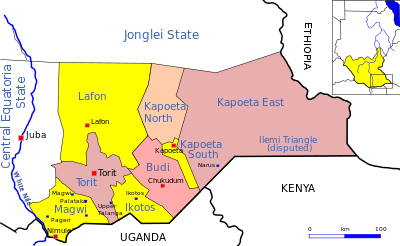Members of the Eastern Equatoria legislature held a meeting recently at which they resolved to oppose the inclusion of the Jie community of Kasengor Payam in the proposed Greater Pibor area of Jonlgei State.
The meeting chaired by MP Julius Wani Moiling resolved that Kasengor Payam remains part and parcel of Eastern Equatoria, claiming it was part of the state since independence of Sudan in 1956, the Catholic Radio Network reported on Saturday.
Part of the resolution mandated members of Eastern Equatoria in the National Legislature to stand against the inclusion of Jie people in the special Pibor area, which the government aims to create in concession to an armed group active in that eastern part of Jonglei.
The resolution by the Eastern Equatorian MPs reportedly requests for any mention of the Jie of Kasengor Paym to be deleted from the peace pact that created the Greater Pibor Administrative Area.
In negotiations last year, SSDM-Cobra faction leader David Yau Yau demanded the creation of a new state in eastern Jonglei that would split the Murle, Anuak, Jie and Kachipo ethnic groups from the Dinka and Nuer groups in the north and west of the state.
Although government negotiators never agreed to this demand, they reached a compromise solution whereby territories of the latter tribes would be grouped into a single ‘Greater Pibor’ area, including Pibor and Pochalla counties, the territories of which are to be subdivided to create additional county seats.
The creation of the Greater Pibor Administrative Area is yet to be ratified by the Council of States. But according to the terms of the peace deal it will have a special interim legal status with an administration “annexed under the Presidency.”
Greater Pibor will be governed by a chief administrator who by protocol will have status equal to that of a state governor, according to the deal. It is widely assumed that the ex-rebel leader David Yau Yau will be appointed to the position.
Meanwhile, the mode of final determination of the region’s legal status will be set by the permanent constitution, which is yet to be made.
The recent meeting against the inclusion of the Jie in the Jonlei sub-region was attended by more than 100 delegates, according to the Catholic Radio Network.
Their resolution follows a similar decision made in May to form a committee to petition the Council of States over Kasengor Payam.
Acting Speaker Paul Napwon at that time said the five-member committee would lobby the Council of States in Juba over the Kasengor dispute, saying the committee included two ministers, Kapoeta East County Commissioner, Toposa community chairperson and five members of the Jie Community.
Another resolution was raised in late April by MP Benjamin Lopeyok Kumuya, who represents Kapoeta East county constituency in the state assembly.
That resolution warned the neighbouring Jonglei government to stay away from Kasengor payam, saying it was part of its Kapoeta East county and not Pibor.
“The Jie people strongly reject and condemn the implication that Kasengor is part of Pibor county and not Eastern Equatoria,” MP Kumuya said.
He was quoted as explaining that the Jie share ethnic similarties with the ‘Nile-hamites’ of Equatoira and the Great Lakes region, rather than the Nilotics of Jonglei.
According to the MP, that the last migration of the Jie people from Uganda was at the beginning of 17th century when they came and settled around Lokaalen river in what is now Kapeota East county in Eastern Equatoria state.
Related coverage:
Yau Yau peace deal to go to Council of States for ratification (14 May)
Draft deal with Cobra Faction to establish Jonglei sub-region (29 March)




